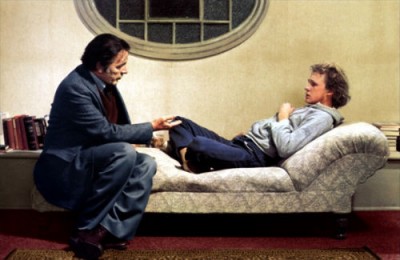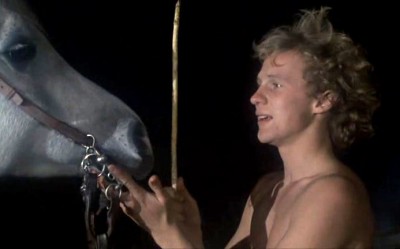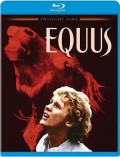| Reviews & Columns |
|
Reviews DVD TV on DVD Blu-ray 4K UHD International DVDs In Theaters Reviews by Studio Video Games Features Collector Series DVDs Easter Egg Database Interviews DVD Talk Radio Feature Articles Columns Anime Talk DVD Savant Horror DVDs The M.O.D. Squad Art House HD Talk Silent DVD
|
DVD Talk Forum |
|
|
| Resources |
|
DVD Price Search Customer Service #'s RCE Info Links |
|
Columns
|
|
|
Equus
THE MOVIE:
Please Note: The stills used here are taken from promotional materials and other sources, not the Blu-ray edition under review.

In college, reading Peter Shaffer's Equus had a profound impact on me. It wouldn't require Freud to figure out. Within the story of a troubled young man who did an unspeakable thing, my own daddy issues collided with my horse phobia like a ham-fisted punch to the gut. Sure, I hadn't committed my own unspeakable acts, but that's all metaphor anyway. Like Joey Tribiani on Friends putting Cujo on ice because it was too scary to leave out in the open, I sent Equus into deep freeze, never to approach it again.
Cut ahead two decades and here I am revisiting it via the Twilight Time Blu-ray of Sidney Lumet's 1977 adaptation of the stageplay, written by Shaffer himself, and starring Peter Firth as the boy and Richard Burton as the burnt-out doctor who tries to help him. Though seeing it this way didn't smack me around with the same force as the text had once upon a time, Lumet's Equus is a strange creation that has much to recommend it all on its own.
Dr. Dysart (Burton) is the head of a psychiatric hospital specializing in youth patients. As a favor to a friend, he takes on an extreme case. A teenaged boy named Alan (Firth) stabbed six horses in the eyes at the stable where he worked and appears incapable of explaining why. Dysart takes him in and begins working on getting the boy to trust him. Simultaneously, he goes in search of background information, interviewing Alan's parents (Colin Blakely and Joan Plowright) and visiting his home and where he worked. Alan slowly comes around, willfully succumbing to Dysart's psychiatric tricks, explaining how a lifelong love of horses dovetailed with his confused image of sexuality and muddled sense of religion to morph into delusion and fetish.
Alan's stories are told in full flashback, with Firth, who originated the role on the stage and is known today for his long-running part on the BBC show Spooks/MI-5, playing the boy at every age. His monologues allow him to act as tour guide of his own memories. Lumet maintains much of the stage conventions from Shaffer's original, including having Firth and Burton play to the camera as if it were a theatrical audience. Dr. Dysart is having his own breakdown, questioning the validity of his methods and his role in Alan's recovery via connective soliloquies peppered throughout the narrative.
Alas, though Burton's fiery performance is quite excellent, those monologues only serve to slow the film down. The technique is wooden, and Dysart's self-examination proves to be less than insightful. The best material is between doctor and patient, pitting Burton's commanding presence against Firth's cagey portrayal of a damaged adolescent. The first-time film actor has a lot to do here. He must first create a false front, a petulant bravado, to mask his pain, and then let Burton chip away at it, revealing all the conflict underneath. Somewhat ironically, Firth is actually at his most affecting when playing it straight. The pivotal scenes between Alan and the girl whose affections send him over the brink (Walkabout's Jenny Agutter, in a sensitive performance) cause one to question the showiness of the more abstract scenes. Alan's late-night horse ride, for instance, is almost too stylized to be believable. Much better is Alan's crucial re-enactment of his rampage. Lumet uses three different elements for the horses being blinded: the real animals, a wooden totem, and an in-between model for the actual eye gouging. The quick cuts between uses our awareness of the false creations to make for a startling, effective illusion. The violence is hard to watch.
Unfortunately, once we've seen it, there's no turning back, and Shaffer's denouement is too weak to counter the intensity of his climax. Perhaps it doesn't help that we knew Alan did what he did all along, and so the act itself is inevitable, thus lessening our surprise at why. Or perhaps nowadays the idea of simply admitting it being enough to purge the guilt and psychoses strikes us as a bit weak. For whatever reason, it's a shock when Equus cuts to black after Dysart's last personal confession. It's almost as if my own therapy remained unfinished.
Such failings are not enough to ruin Equus. It still remains a bold attempt to marry image and theme, and in many ways finds a comfort zone where the theatricality and heaviness of Shaffer's original text can translate to cinema. That Lumet's goals lie somewhere beyond his achievement arguably makes Equus a more interesting film, avoiding the dreary handwringing that could have resulted had he otherwise played it safe.

THE BLU-RAY
Video:
The widescreen high-def transfer here, mastered at 1080p and shown as a 1.85:1 aspect ratio, looks very good, with nice resolution and no apparent print damage. Colors seem well timed and indicative of the 1970s film stock on which it was shot, with decent skin tones and an overall strong contrast between light and dark. I didn't note any real evidence of enhancement or exaggeration of tones.
Sound:
The original mono soundtrack has been remastered in 1.0 DTS-HD MA, and it sounds excellent. Dialogue is clear, and music comes through strong without distortion.
Closed Captioning is available in English.
Extras:
As with most Twilight Time releases, we are treated to the expected isolated score audio track as well as an audio commentary, this time by historians Julie Kirgo and Nick Redman. Kirgo also provides the liner notes for the accompanying booklet.
The big extra here is the 1988 two-hour documentary In from the Cold: The World of Richard Burton. Tony Palmer's extended profile of the actor, which includes wonderful archival clips of the man himself, gives a balanced portrait of an extraordinary performer.
The theatrical trailer is also included.
FINAL THOUGHTS:
Recommended. Some of Sidney Lumet's experiments can be a little dated, as can some of the psychobabble in the script, but this 1977 adaptation of Peter Shaffer's Equus is still a fine piece of work. The drama of a disturbed young man who commits a heinous crime against six horses is brought to life in bravura performances by Peter Firth and Richard Burton, who bring an appropriate intensity to the heavy themes. Some of the staginess that Lumet tried to bring over from the original theatrical production only serves to slow things down, but the core story maintains its emotional impact.
Jamie S. Rich is a novelist and comic book writer. He is best known for his collaborations with Joelle Jones, including the hardboiled crime comic book You Have Killed Me, the challenging romance 12 Reasons Why I Love Her, and the 2007 prose novel Have You Seen the Horizon Lately?, for which Jones did the cover. All three were published by Oni Press. His most recent projects include the futuristic romance A Boy and a Girl with Natalie Nourigat; Archer Coe and the Thousand Natural Shocks, a loopy crime tale drawn by Dan Christensen; and the horror miniseries Madame Frankenstein, a collaboration with Megan Levens. Follow Rich's blog at Confessions123.com.
|
| Popular Reviews |
| Sponsored Links |
|
|
| Sponsored Links |
|
|
| Release List | Reviews | Shop | Newsletter | Forum | DVD Giveaways | Blu-Ray | Advertise |
|
Copyright 2024 DVDTalk.com All Rights Reserved. Legal Info, Privacy Policy, Terms of Use,
Manage Preferences,
Your Privacy Choices | |||||||













